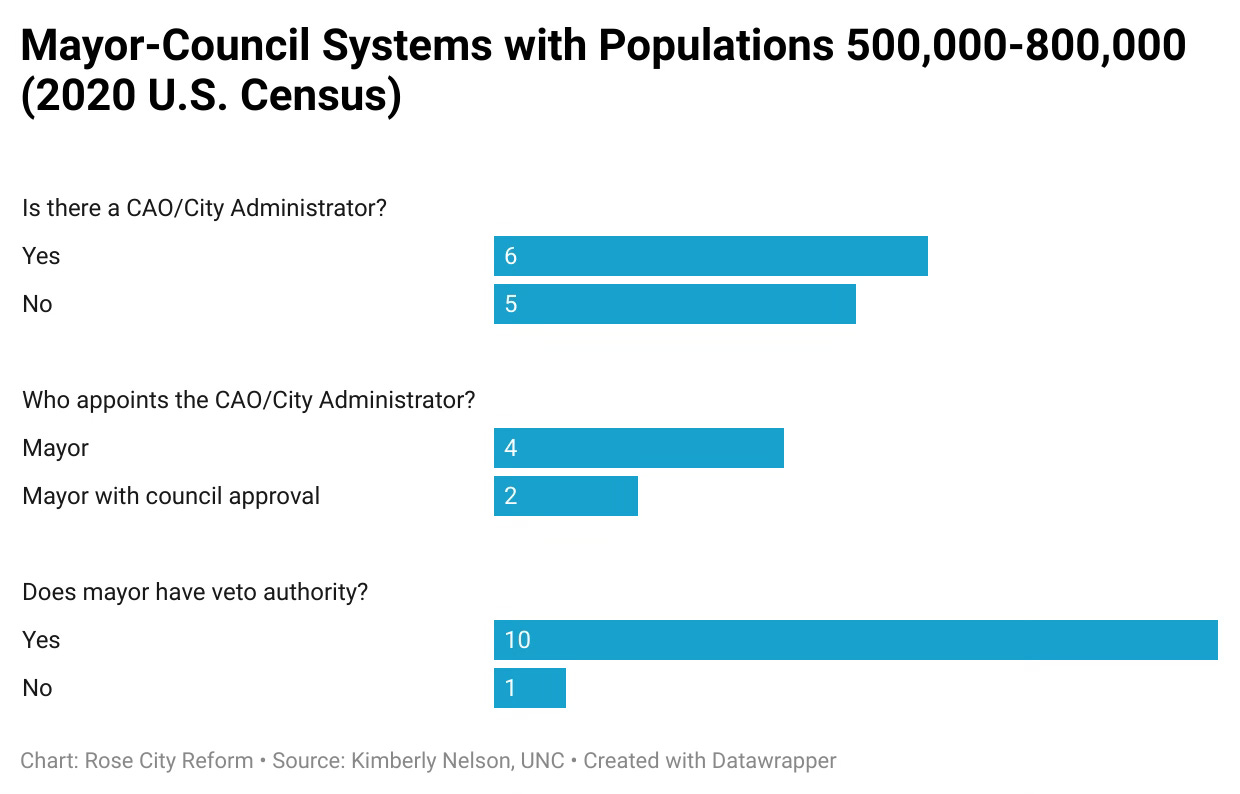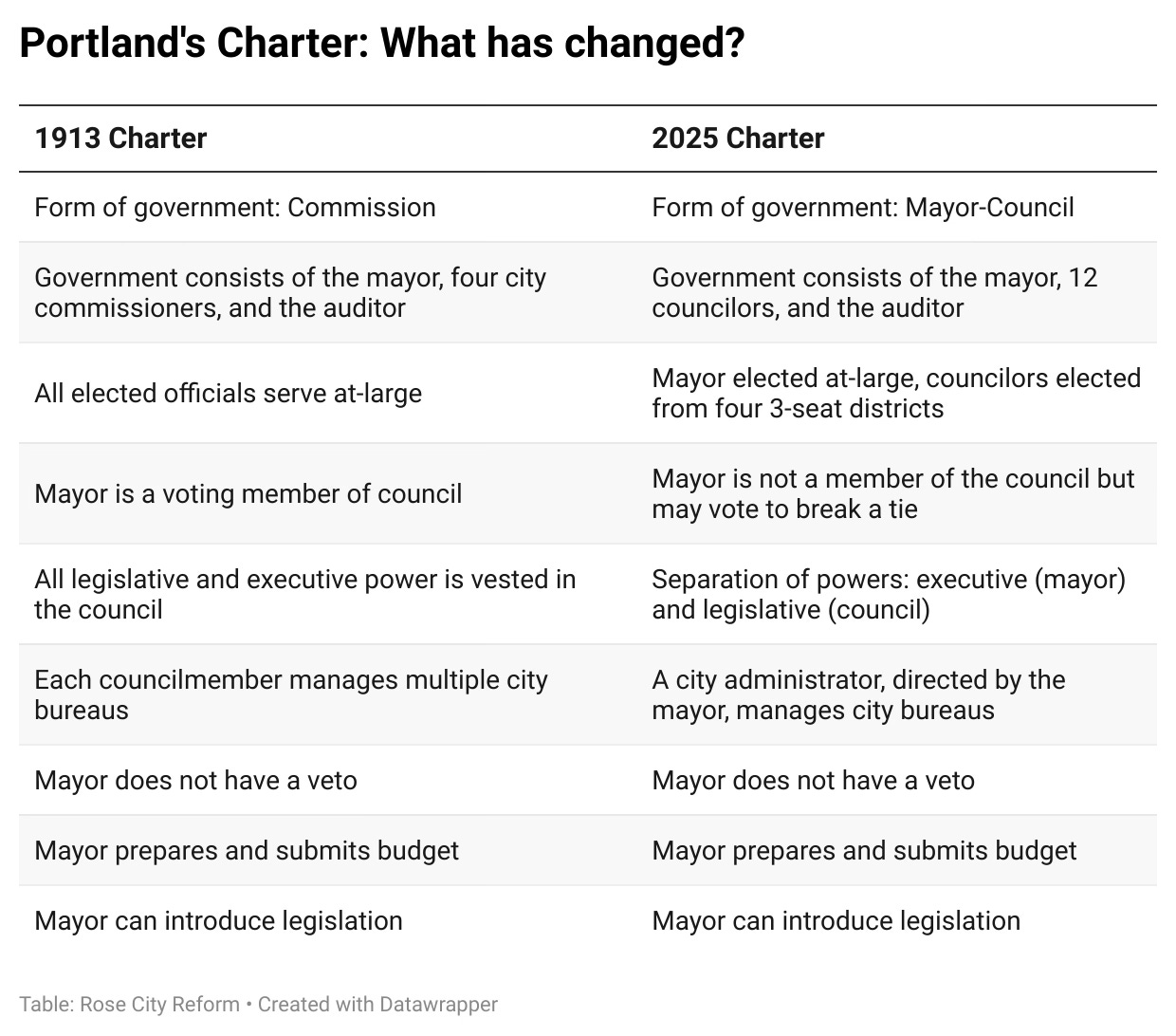Does Portland Have a "Strong" or "Weak" Mayor?
That's the most frequent question we get from readers. In a new report, Rose City Reform explores the scope of the mayor's formal powers.
For the first time in over a century, Portland’s mayor is truly in charge. Last month, as a brand-new city charter kicked into effect, Mayor Keith Wilson took office with executive control of all city bureaus.
It’s a big change.
Wilson’s predecessors, including former Mayor Ted Wheeler, shared this authority with four city commissioners. Each commissioner managed their own set of city bureaus—a fragmented leadership model Portlanders jokingly referred to as having five “mini-mayors.”
Portland’s new system makes the mayor the city’s chief executive, while the city council legislates and passes the budget. Yet, questions remain about Wilson’s ability to advance his own agenda. Unlike most big-city mayors, he has neither a legislative veto nor a line-item veto over the looming city budget.
So—what exactly is the scope of the mayor’s formal powers? That’s the topic of a new research report from Rose City Reform. Read the full report here.
What Makes a Mayor Strong?
Kimberly Nelson, a professor at the University of North Carolina’s School of Government and author of Municipal Corruption—From Policies to People, specializes in classifying city governments across the United States.
“Portland has chosen an executive mayor-council system—what some people would call a ‘strong’ mayor-council system,” Nelson explains.
The mayor-council system, modeled after state and federal governments, is the second most common form of government in the United States. Used by approximately 38% of cities, it divides authority between a legislative branch (the council) and an executive branch (the mayor). In contrast, the council-manager system—used by roughly 48%—vests all powers in the council, which then delegates administrative and executive functions to a city manager1.
Not all mayor-council systems grant equal authority to their mayors—giving rise to the terms “strong” or “weak” to describe the mayor’s degree of executive power. According to Nelson, Portland’s mayor exhibits most hallmark features of a strong executive, including proposing the budget, selecting top leadership, and overseeing general city affairs.
“Apart from not having a veto, I don’t see many checks on the mayor’s authority,” she says.
Portland’s mayor also holds two powers that are rare among executive mayors: the ability to introduce legislation directly and to cast a tiebreaking vote.
“Introducing legislation and breaking ties are legislative powers, so they’re unusual in mayor-council systems, which tend to separate legislative and executive authority,” Nelson explains.
The City Administrator, the Mayor’s Ally or Competitor?
But what about the fact that Portland’s charter requires the mayor to delegate some impactful responsibilities—such as hiring and firing bureau directors—to a hired city administrator? Does that cut the mayor out of those decisions?
Not necessarily, says Nelson, who believes the charter makes it clear that the administrator serves at the pleasure of the mayor.
“When you can be hired and fired by the mayor, the mayor is directing your work. If you’re the city administrator, you’re going to consult the mayor,” she says.
Portland’s city administrator should not be conflated with a city manager in a council-manager system, Nelson notes. In council-manager systems, best practices discourage elected officials from interfering in the city manager’s decisions. Portland’s mayor, Nelson says, is free to be as involved as they choose.
“In mayor-council cities, the relationship between the mayor and the city administrator can be hierarchical, with the mayor heavily hands-on, or you could have a mayor who prefers to focus on policy and community relations while leaving day-to-day operations to the administrator. You see a great deal of variation in these roles—and the quality of the government largely depends on the skill and integrity of the individuals occupying those roles,” Nelson observes.
A Delicate Balancing Act
While the mayor has the power to appoint, supervise, and fire the city administrator, the council is not without influence over the position. When Mayor Wilson appointed Michael Jordan to the city administrator post earlier this month, the council had to approve the choice. During the tense confirmation hearing, Councilor Loretta Smith reminded Wilson that the legislative body has the authority to remove Jordan with a three-fourths vote.
“As you know, if we wanted to terminate that contract, we wouldn’t need your vote. This council can terminate it without your blessing,” Smith told Wilson point-blank.
Wilson, seated before the legislative body, answered simply: “Yes.”
Professor Jim Svara, a scholar on mayoral leadership, says the council’s ability to remove the administrator is a good thing.
“It’s a useful device in case the relationship between the mayor and the administrator gets tilted too heavily toward the mayor’s interests and ambitions. For the system to be successful, the administrator needs to be viewed as a professional promoting shared goals,” says Svara, now retired from Arizona State University’s School of Public Affairs.
A Higher Threshold for Council Removal
Jordan alluded to this dual responsibility when pressed about his duties toward the council.
“I’m unilaterally responsible to the mayor every day, every hour, every minute—and I’m responsible to a supermajority of you every day, every hour, every minute,” he told council members.
A supermajority is a high bar, however: nine out of twelve votes. The mayor, on the other hand, can fire the administrator at will—a dynamic both Nelson and Svara believe creates a strong institutional incentive for the administrator to prioritize the mayor’s directives. Additionally, if the city administrator position is vacant, the charter empowers the mayor to fill the role until a replacement is found.
Svara believes Wilson and Jordan should prioritize building trust with council members, emphasizing that communication will be key to a productive working relationship.
“The mayor needs to be open to ideas from the council and help council members develop policy proposals and new programs,” he advises, suggesting that the council conduct periodic assessments of the city administrator to establish a feedback loop between the council and the mayor.
No Veto, Less Conflict?
One of the most hotly contested aspects of Portland’s reform package was the decision not to give the mayor a veto. In a 2023 interview with Rose City Reform, then-Mayor Ted Wheeler warned that because the mayor could not block council legislation, his successor would be “told what to do by the council and have to implement whether they like it or not.” Wheeler predicted that without veto power, the mayor would simply slow-walk implementation and that failed policies would result in finger-pointing between the executive and legislative branches.
Jim Svara isn’t so sure.
“I think the absence of a mayoral veto will actually reduce the likelihood of conflict because it sends a clear signal that the mayor and the council must work together,” says Svara, whose book The Facilitative Leader in City Hall examines mayors who succeed at fostering collaboration.
“One could argue that the mere fact of a mayor being able to block council legislation creates the conditions for conflict. Without a veto, mayors must use their powers and resources to entice council members to support their ideas rather than punish the opposition, which is a fairly common occurrence in mayor-council governments.”
In a 2024 interview with Rose City Reform, then-candidate Keith Wilson echoed the same sentiment.
“If you have collaboration, do your research, have good policies, and implement them well—you don’t need a veto,” Wilson said.

Expect Growing Pains
Portland’s new system is still in its early days—less than two months old—and the dynamics between the mayor and council are still taking shape.
As an illustration, debate erupted during the council’s inaugural meeting over whether the mayor had the authority to break a tie in the election of the council president. After consulting the city attorney, a majority of councilors voted against such an intervention—leaving open questions about when and how the mayor will be invited to cast votes in the future.
Similar uncertainties surround the mayor’s implementation of the council’s legislation. While the mayor can’t block an ordinance, the charter doesn’t specify how rigorously or promptly the mayor must enforce it.
An Org Chart Like No Other
In the face of impending austerity measures, budget debates have also emerged over the distribution of resources between the legislative and administrative branches. While the council recently voted to expand both its own and the mayor’s staff, some councilors argue that the city administrator’s office could trim some fat.
Kimberly Nelson notes that Portland’s administrative bureaucracy is on the larger side. In addition to an assistant administrator, the city administrator oversees six deputy city administrators—an uncommon structure for a mayor-council city.
“The number of deputy administrators—I’ve never seen anything like it,” Nelson says. Even in council-manager cities, where a city manager—not a mayor—runs city affairs, leadership teams tend to be smaller, she observes.
“Oklahoma City comes closest, with four assistant city managers, and that’s a council-manager city.”
Many Right Ways to Govern
While Portland’s staffing structure appears to incorporate elements of both governance models, Nelson says the charter is clear about how power flows.
“By having the mayor and administrator handle all administrative authority, Portland has avoided some of the problems that arise when governments truly hybridize,” she says.
“The worst outcome is when staff doing the day-to-day work of the city don’t know who they report to or who they’re accountable to. That doesn’t seem to be the case in Portland under the new charter.”
Ultimately, Nelson says the success of Portland’s new system will depend on the quality of the people in office.
“This form of government will work well if you elect moral and skilled leaders. At some points in your history, it’s going to work well. Other times, I predict it won’t.”
Rose City Reform Turns Three!
Today is Rose City Reform’s third birthday. To all of our readers—thank you for your support, questions, suggestions, and constructive criticism.
Here’s to another year of tracking Portland’s reform effort! 🎉🎂






